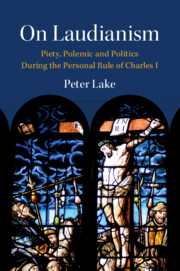Book contents
- On Laudianism
- Cambridge Studies in Early Modern British History
- On Laudianism
- Copyright page
- Contents
- Acknowledgements
- Abbreviations
- Introduction
- Part I Laudianism: Where It Came From
- Part II Laudianism: What It Was
- Holy Places
- Holy Ordinances
- Holy Times
- Chapter 17 The Feasts and Festivals of the Church, or Putting the Sabbath in Its Place
- Chapter 18 Sunday Sports and the Re/constitution of the Christian Community and the Social Order
- Chapter 19 The Sabbath and the Laudian Attitude to Authority
- Part III Laudianism: What It Wasn’t
- Part IV Laudianism and Predestination
- Part V Laudianism as Coalition: The Constituent Parts
- Conclusion
- Index
Chapter 18 - Sunday Sports and the Re/constitution of the Christian Community and the Social Order
from Holy Times
Published online by Cambridge University Press: 05 October 2023
- On Laudianism
- Cambridge Studies in Early Modern British History
- On Laudianism
- Copyright page
- Contents
- Acknowledgements
- Abbreviations
- Introduction
- Part I Laudianism: Where It Came From
- Part II Laudianism: What It Was
- Holy Places
- Holy Ordinances
- Holy Times
- Chapter 17 The Feasts and Festivals of the Church, or Putting the Sabbath in Its Place
- Chapter 18 Sunday Sports and the Re/constitution of the Christian Community and the Social Order
- Chapter 19 The Sabbath and the Laudian Attitude to Authority
- Part III Laudianism: What It Wasn’t
- Part IV Laudianism and Predestination
- Part V Laudianism as Coalition: The Constituent Parts
- Conclusion
- Index
Summary
This chapter analyses the Laudian attitude to Sunday sports, in a discussion designed to include the meaning of the altar and the sacrament in the constitution of the Christian community. Allowing Sunday sports re-inscribed the line between the secular and the spiritual as defined by the Laudian notions of holy places and holy times. It allowed affirmations of two different versions of the social body to be made on the same day, the one reinforcing the other, and it also prevented the day being dominated, and the social body being divided, by the essentially private, household-based, religious observances of the puritans. Here was affirmation of a broad-based Laudian version of the Christian community being enabled and maintained by the rites and observances of the national church against the divisive practices and beliefs of the puritans.
- Type
- Chapter
- Information
- On LaudianismPiety, Polemic and Politics During the Personal Rule of Charles I, pp. 235 - 245Publisher: Cambridge University PressPrint publication year: 2023

